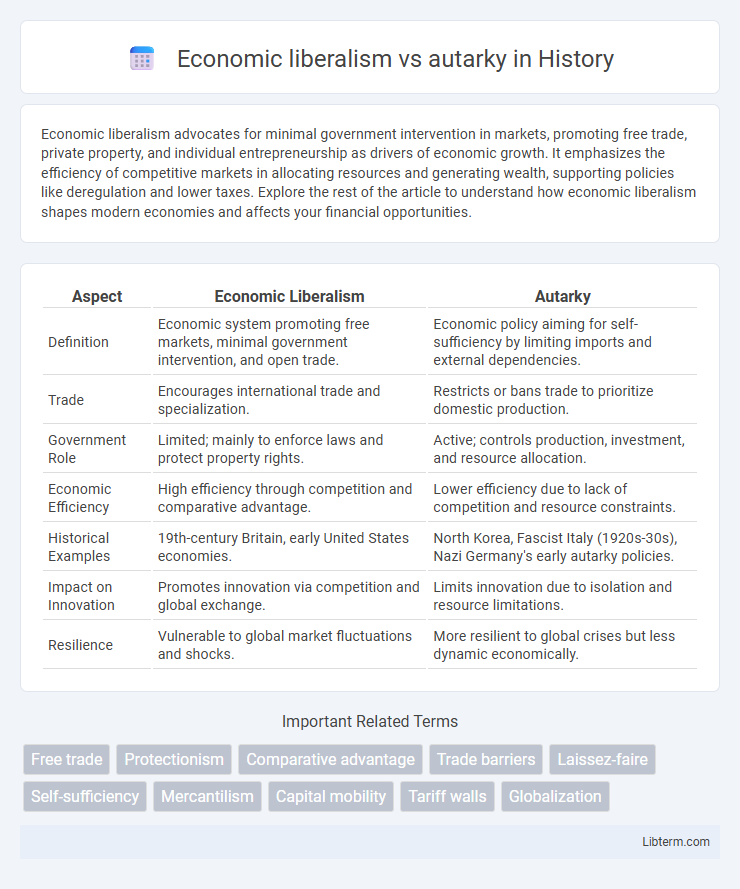Economic liberalism advocates for minimal government intervention in markets, promoting free trade, private property, and individual entrepreneurship as drivers of economic growth. It emphasizes the efficiency of competitive markets in allocating resources and generating wealth, supporting policies like deregulation and lower taxes. Explore the rest of the article to understand how economic liberalism shapes modern economies and affects your financial opportunities.
Table of Comparison
| Aspect | Economic Liberalism | Autarky |
|---|---|---|
| Definition | Economic system promoting free markets, minimal government intervention, and open trade. | Economic policy aiming for self-sufficiency by limiting imports and external dependencies. |
| Trade | Encourages international trade and specialization. | Restricts or bans trade to prioritize domestic production. |
| Government Role | Limited; mainly to enforce laws and protect property rights. | Active; controls production, investment, and resource allocation. |
| Economic Efficiency | High efficiency through competition and comparative advantage. | Lower efficiency due to lack of competition and resource constraints. |
| Historical Examples | 19th-century Britain, early United States economies. | North Korea, Fascist Italy (1920s-30s), Nazi Germany's early autarky policies. |
| Impact on Innovation | Promotes innovation via competition and global exchange. | Limits innovation due to isolation and resource limitations. |
| Resilience | Vulnerable to global market fluctuations and shocks. | More resilient to global crises but less dynamic economically. |
Defining Economic Liberalism and Autarky
Economic liberalism advocates for minimal government intervention in markets, emphasizing free trade, private property rights, and open competition to drive economic growth. Autarky refers to a self-sufficient economic system where a country limits or eliminates foreign trade to achieve complete economic independence. These contrasting approaches influence national policies on trade, resource allocation, and economic openness.
Historical Origins of Economic Liberalism
Economic liberalism emerged in the late 18th century, influenced by Enlightenment thinkers such as Adam Smith, whose seminal work "The Wealth of Nations" (1776) advocated free markets and limited government intervention. This philosophy arose as a response to mercantilism and autarkic policies prevalent in feudal and early modern Europe, promoting individual economic freedom and international trade. The historical origins of economic liberalism underscore its foundation on principles of competition, private property, and the invisible hand guiding market efficiency.
The Roots and Rise of Autarky
The roots of autarky trace back to the interwar period when nationalist economic policies aimed to reduce dependence on foreign trade amid global instability. Economic liberalism, emphasizing open markets and free trade, contrasted sharply with autarky's focus on self-sufficiency and protectionism to safeguard domestic industries. The rise of autarky gained momentum as countries like Nazi Germany and Fascist Italy implemented state-controlled economies to achieve political and strategic independence.
Core Principles: Openness vs. Self-Sufficiency
Economic liberalism emphasizes openness through free trade, market competition, and minimal government intervention to foster efficiency and innovation. Autarky prioritizes self-sufficiency by minimizing foreign dependence and focusing on domestic production to protect national industries and maintain economic independence. These core principles reflect contrasting views on the role of international exchange in economic development and resilience.
Trade Policies: Free Markets vs. Trade Barriers
Economic liberalism advocates for free markets, emphasizing minimal trade barriers such as tariffs and quotas to promote international competition and efficiency. Autarky supports self-sufficiency with strict trade barriers designed to protect domestic industries from foreign competition. Free trade policies under economic liberalism facilitate resource allocation based on comparative advantage, whereas autarky prioritizes economic independence at the cost of reduced market access and higher production costs.
Impact on Economic Growth and Innovation
Economic liberalism fosters economic growth and innovation by promoting open markets, competition, and the free flow of goods, services, and ideas, which incentivize investment and technological advancement. Autarky, characterized by economic self-sufficiency and protectionist policies, often limits access to external technologies and markets, resulting in slower growth and reduced innovation capacity. Empirical studies show countries embracing liberal trade policies typically experience higher GDP growth rates and more rapid technological progress compared to those pursuing autarkic strategies.
Social and Political Implications
Economic liberalism promotes open markets, encouraging individual freedoms and fostering democratic institutions by prioritizing private property rights and limited government intervention. Autarky, characterized by economic self-sufficiency and state control, often leads to political centralization and social restrictions as governments curb external influences to maintain control. The contrast between these ideologies reflects differing social policies: liberalism supports social mobility and pluralism, while autarky may enforce uniformity and suppress dissent to uphold economic isolation.
Case Studies: Successes and Failures
Economic liberalism, exemplified by the success of post-war Germany and Singapore, demonstrates how open markets, free trade, and minimal government intervention foster innovation, efficiency, and growth. In contrast, autarkic policies in countries like North Korea and Zimbabwe highlight failures marked by economic isolation, resource misallocation, and stagnation due to limited access to global markets and foreign investment. These case studies underscore the critical role of economic openness and integration in achieving long-term development and prosperity.
Economic Liberalism vs. Autarky in a Globalized World
Economic liberalism promotes free trade, open markets, and minimal government intervention, driving global economic integration and efficiency. Autarky, prioritizing self-sufficiency and avoiding international dependency, often results in limited market access and slower economic growth. In a globalized world, economic liberalism tends to enhance innovation, competitiveness, and consumer choice, whereas autarky can hinder these advantages by isolating economies from global value chains and technology transfer.
Future Prospects and Policy Recommendations
Economic liberalism fosters global trade integration and innovation, driving sustainable growth through open markets and competitive advantage. Autarky, characterized by economic self-sufficiency, faces challenges such as inefficiencies and limited access to technological advancements, hindering long-term development. Policy recommendations emphasize balancing openness with strategic protectionism, investing in innovation ecosystems, and enhancing international cooperation to achieve resilient and inclusive economic progress.
Economic liberalism Infographic

 libterm.com
libterm.com